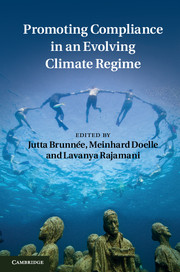Book contents
- Frontmatter
- Contents
- Contributors
- Preface
- Abbreviations
- Introduction: The role of compliance in an evolving climate regime
- Part I Context
- Part II The Kyoto compliance system: Features and experience
- Part III Compliance and the climate regime: Issues, options, and challenges
- 7 The role of non-state actors in climate compliance
- 8 Facilitation of compliance
- 9 Enforcing compliance in an evolving climate regime
- 10 Financial mechanisms under the climate regime
- 11 Post-2012 compliance and carbon markets
- 12 Compliance and the use of trade measures
- 13 ‘Comparability of efforts’ among developed country parties and the post-2012 compliance system
- 14 From the Kyoto compliance system to MRV
- 15 Compliance in transition countries
- 16 Developing countries and compliance in the climate regime
- 17 The role of dispute settlement in the climate regime
- 18 Depoliticizing compliance
- Part IV A look forward
- Bibliography
- Index
- References
17 - The role of dispute settlement in the climate regime
Published online by Cambridge University Press: 05 January 2012
- Frontmatter
- Contents
- Contributors
- Preface
- Abbreviations
- Introduction: The role of compliance in an evolving climate regime
- Part I Context
- Part II The Kyoto compliance system: Features and experience
- Part III Compliance and the climate regime: Issues, options, and challenges
- 7 The role of non-state actors in climate compliance
- 8 Facilitation of compliance
- 9 Enforcing compliance in an evolving climate regime
- 10 Financial mechanisms under the climate regime
- 11 Post-2012 compliance and carbon markets
- 12 Compliance and the use of trade measures
- 13 ‘Comparability of efforts’ among developed country parties and the post-2012 compliance system
- 14 From the Kyoto compliance system to MRV
- 15 Compliance in transition countries
- 16 Developing countries and compliance in the climate regime
- 17 The role of dispute settlement in the climate regime
- 18 Depoliticizing compliance
- Part IV A look forward
- Bibliography
- Index
- References
Summary
Introduction
There is a range of possible disputes that could arise relating to the climate change regime. These include disputes between parties as to the interpretation and application of provisions of the United Nations Framework Convention on Climate Change (FCCC) and Kyoto Protocol, as well as potentially any new instruments that may be adopted for the period after 2012. Such disputes might concern emission reduction commitments, but also, for example, the scope and fulfilment of commitments on financing, technology transfer, and adaptation. Under the existing dispute settlement provisions applicable in the FCCC and Kyoto Protocol, such disputes might conceivably be raised before the International Court of Justice (ICJ), or in arbitration or conciliation proceedings. Other dispute settlement mechanisms and bodies may also be called upon to decide climate-related disputes, including, for example, courts and tribunals established or utilized under other specialist regimes, such as the UN Convention on the Law of the Sea. These types of disputes between states have not arisen to date, yet cannot be ruled out for the future.
Other disputes may involve non-state actors. Indeed, a number of disputes involving states, supranational institutions, and private parties have already arisen relating to the Kyoto Protocol, in particular out of the establishment and operation of the Kyoto Protocol flexibility mechanisms, such as contractual or other disputes that might be addressed by arbitration or other dispute resolution processes. Brown has highlighted the potential for disputes between states or private entities and bodies established under the Kyoto Protocol, such as the Clean Development Mechanism (CDM) Executive Board. Nor can one rule out the possibility of national climate policies and measures giving rise to disputes between states and foreign investors, and the possible invocation of investor–state arbitration provisions. Climate change policies or impacts could give rise to cases before regional human rights tribunals or international human rights mechanisms. Furthermore, depending upon the way in which they are structured, the conditions under which REDD+ projects are planned and implemented might also conceivably give rise to disputes between non-state actors, or between non-state actors and states or climate finance institutions. Finally, experience within the European Union has already demonstrated the possible role of regional courts (and national courts) in disputes concerning emissions trading, including disputes between member states and supranational institutions.
- Type
- Chapter
- Information
- Promoting Compliance in an Evolving Climate Regime , pp. 395 - 417Publisher: Cambridge University PressPrint publication year: 2011
References
- 1
- Cited by



